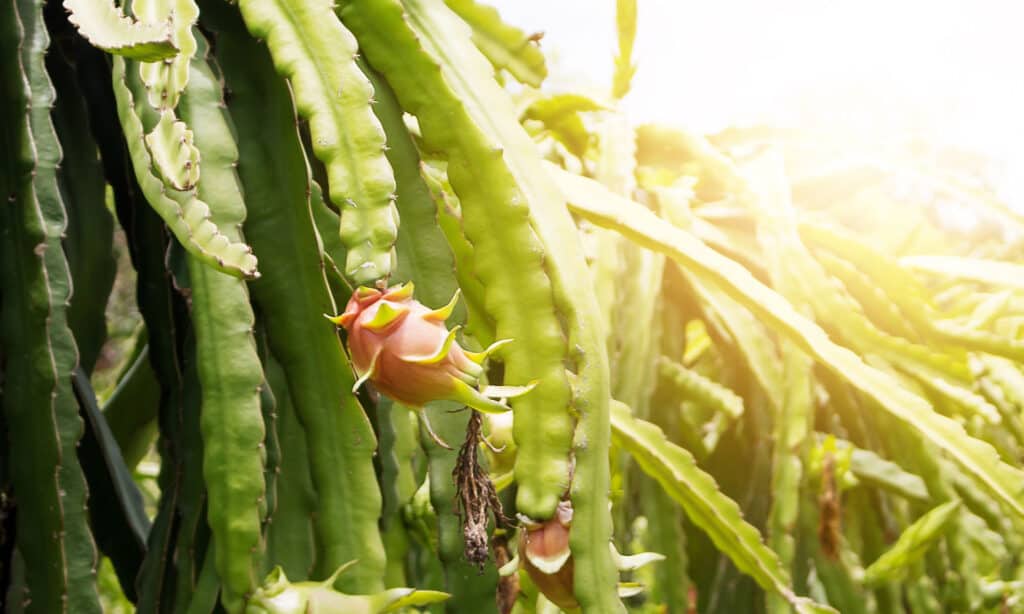As a dog owner, you know that your furry friend loves to snack on treats and sometimes even sneak a bite of your food. One such food that has gained popularity in recent years is the exotic and colorful dragon fruit. With its vibrant appearance and numerous health benefits, you might be wondering if this unique fruit is safe for your canine companion to enjoy. In this blog post, we’ll explore the question, “Can dogs eat dragon fruit?” and delve into the potential risks and benefits of this tropical treat for your pet. So, let’s get started and find out if your four-legged friend can safely indulge in this delicious fruit!

Is Dragon Fruit Safe for Dogs to Eat?
Good news for pet owners – dragon fruit is generally safe for dogs to eat! This exotic fruit is non-toxic to dogs and can provide numerous health benefits when consumed in moderation. However, it’s essential to be aware of potential risks and concerns when introducing any new food to your dog’s diet.
General Safety of Dragon Fruit Consumption for Dogs: Dragon fruit does not contain any known toxic components for dogs, making it a safe treat for your furry friend. When fed in appropriate amounts, this fruit can be a nutritious and delicious addition to your dog’s diet.
Potential Health Benefits for Dogs Eating Dragon Fruit: As we’ve discussed earlier, dogs can enjoy various health benefits from consuming dragon fruit, such as immune system support, improved digestion, and an overall boost in essential vitamins and minerals.
Possible Risks and Concerns of Feeding Dragon Fruit to Dogs: While dragon fruit is safe for dogs to eat, it’s important to keep a few potential concerns in mind:
- Allergic Reactions: Some dogs might be sensitive or allergic to dragon fruit or any new food. Always monitor your pet closely for signs of an allergic reaction, such as itching, hives, swelling, or difficulty breathing. If you notice any of these symptoms, stop feeding dragon fruit immediately and consult your veterinarian.
- Gastrointestinal Upset: Overconsumption of any fruit, including dragon fruit, can lead to gastrointestinal upset in dogs. Too much sugar and fiber at once may cause diarrhea, vomiting, or stomach pain. To avoid this, always start with a small amount of dragon fruit and gradually increase the serving size over time, making sure your dog tolerates it well.
Remember to introduce dragon fruit slowly.
Dragon Fruit Nutritional Benefits for Dogs
Dragon fruit, also known as pitahaya or pitaya, is not only a tasty treat but also packed with various nutrients that can be beneficial for your dog’s health. Let’s take a closer look at the nutritional benefits this exotic fruit offers to our canine friends:
- Antioxidants: Dragon fruit is rich in antioxidants, which are essential for maintaining a healthy immune system. These antioxidants help neutralize free radicals in your dog’s body, protecting their cells from damage and promoting overall health.
- Vitamins and Minerals: This vibrant fruit is an excellent source of essential vitamins and minerals that support various bodily functions in dogs. Dragon fruit contains vitamin C, which boosts the immune system, and vitamin A, which is vital for maintaining good vision and healthy skin. It also provides minerals like calcium and phosphorus, necessary for strong bones and teeth, as well as iron and magnesium, which support overall well-being.
- Dietary Fiber: Dragon fruit has a high fiber content, which can be beneficial for your dog’s digestive health. Fiber helps regulate bowel movements, prevents constipation, and aids in maintaining a healthy weight by promoting a feeling of fullness.
- Low-Calorie Treat: With its low calorie count, dragon fruit can be a perfect treat for dogs on a weight management plan or those prone to obesity. This nutritious fruit can satisfy your dog’s sweet tooth without adding too many extra calories to their diet.
Dragon fruit is a nutrient-rich food that can offer numerous health benefits to your dog when fed in moderation. From immune support to digestive health, this exotic fruit can be a valuable addition to your dog’s diet. However, as with any new food, it’s essential to consider potential risks and monitor your pet for any adverse reactions.

How to Properly Serve Dragon Fruit to Your Dog
Introducing dragon fruit to your dog’s diet can be an exciting experience for both you and your furry friend. To make sure your pet enjoys the fruit safely, follow these guidelines on how to prepare and serve dragon fruit to your dog:
Preparing Dragon Fruit for Dogs:
- Select a ripe dragon fruit that is slightly soft to the touch.
- Wash the fruit thoroughly to remove any dirt or pesticides.
- Cut the fruit in half and scoop out the inner flesh, discarding the outer skin as it can be tough and difficult for dogs to digest.
- Remove any seeds if your dog is sensitive to them, though they are generally safe for consumption.
- Cut the flesh into small, bite-sized pieces appropriate for your dog’s size.
Serving Sizes: The appropriate serving size for dragon fruit depends on your dog’s size, weight, and dietary needs. As a general rule, start with a small amount (a teaspoon for small dogs and a tablespoon for larger dogs) to ensure they don’t have an adverse reaction. You can gradually increase the serving size over time if your dog enjoys the fruit and tolerates it well.
How Often to Include Dragon Fruit in Your Dog’s Diet: Dragon fruit should be fed as an occasional treat rather than a regular part of your dog’s diet. Feeding it once or twice a week should be sufficient to provide your dog with its nutritional benefits without causing any digestive issues. Always ensure that your dog’s primary source of nutrition comes from a balanced, high-quality dog food.
By following these steps, you can safely serve dragon fruit to your dog as a delicious and nutritious treat.

Dog-Friendly Fruit Alternatives to Dragon Fruit
While dragon fruit is a safe and nutritious option for your dog, there are several other fruits that you can also incorporate into your pet’s diet. Here’s a list of some dog-safe fruit alternatives that offer various health benefits:
- Apples: Apples are a great source of vitamins A and C, as well as fiber. Be sure to remove the core and seeds, as they can be harmful to dogs. Cut apples into small, bite-sized pieces for a crunchy treat your dog will love.
- Blueberries: These small berries are packed with antioxidants, vitamins, and fiber, making them a fantastic treat for your dog. They can be served fresh or frozen for a refreshing and healthy snack.
- Bananas: Rich in potassium, vitamins, and biotin, bananas are a tasty and nutritious treat for dogs. Feed your dog small slices of banana as an occasional treat, but be mindful of the sugar content.
- Strawberries: Strawberries are high in vitamin C, fiber, and antioxidants. Feed your dog fresh or frozen strawberries in moderation, as they also contain sugar. Make sure to cut them into small pieces for easier consumption.
- Cantaloupe: This sweet melon is a good source of vitamins A, B, and C, as well as potassium and fiber. Remove the rind and seeds before serving cantaloupe to your dog, and offer small, bite-sized pieces as an occasional treat.
When introducing any new fruit to your dog’s diet, always start with small amounts. Monitor their reaction to ensure they tolerate it well. Offering a variety of safe and nutritious fruits can add excitement and variety to your dog’s treat options.

Conclusion
Dragon fruit is not only a safe but also a nutritious and delicious treat for your dog. This exotic fruit provides a range of health benefits thanks to its rich content of antioxidants, vitamins, minerals, and fiber. When properly prepared and served in moderation, dragon fruit can be a delightful addition to your dog’s treat options.
There are several dog-friendly fruit alternatives that can also provide various health benefits when fed appropriately. Always remember to introduce new fruits slowly and monitor your dog’s reaction to ensure their safety and enjoyment.
By incorporating dragon fruit and other safe fruits into your dog’s diet, you can offer exciting and nutritious treats. They will not only satisfy your pet’s taste buds but also contribute to their overall health and well-being. Go ahead and share the fruity goodness with your four-legged friend. Know that you’re providing them with a tasty and beneficial snack!
~Sheena
